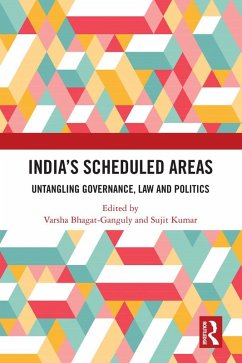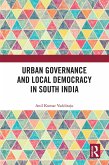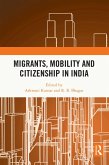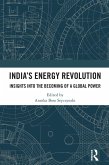India's Scheduled Areas (eBook, ePUB)
Untangling Governance, Law and Politics
Redaktion: Bhagat-Ganguly, Varsha; Kumar, Sujit
40,95 €
40,95 €
inkl. MwSt.
Sofort per Download lieferbar

20 °P sammeln
40,95 €
Als Download kaufen

40,95 €
inkl. MwSt.
Sofort per Download lieferbar

20 °P sammeln
Jetzt verschenken
Alle Infos zum eBook verschenken
40,95 €
inkl. MwSt.
Sofort per Download lieferbar
Alle Infos zum eBook verschenken

20 °P sammeln
India's Scheduled Areas (eBook, ePUB)
Untangling Governance, Law and Politics
Redaktion: Bhagat-Ganguly, Varsha; Kumar, Sujit
- Format: ePub
- Merkliste
- Auf die Merkliste
- Bewerten Bewerten
- Teilen
- Produkt teilen
- Produkterinnerung
- Produkterinnerung

Bitte loggen Sie sich zunächst in Ihr Kundenkonto ein oder registrieren Sie sich bei
bücher.de, um das eBook-Abo tolino select nutzen zu können.
Hier können Sie sich einloggen
Hier können Sie sich einloggen
Sie sind bereits eingeloggt. Klicken Sie auf 2. tolino select Abo, um fortzufahren.

Bitte loggen Sie sich zunächst in Ihr Kundenkonto ein oder registrieren Sie sich bei bücher.de, um das eBook-Abo tolino select nutzen zu können.
This volume explores the reasons behind the disregard for legal and institutional mechanism designed for the Scheduled Areas. It questions the role of the State in the neoliberal era on counts of fund allocation and utilization, ineffectiveness of the existing administrative structures and processes.
- Geräte: eReader
- ohne Kopierschutz
- eBook Hilfe
- Größe: 4.35MB
Andere Kunden interessierten sich auch für
![India's Water Futures (eBook, ePUB) India's Water Futures (eBook, ePUB)]() India's Water Futures (eBook, ePUB)42,95 €
India's Water Futures (eBook, ePUB)42,95 €![Land Rights in India (eBook, ePUB) Land Rights in India (eBook, ePUB)]() Land Rights in India (eBook, ePUB)50,95 €
Land Rights in India (eBook, ePUB)50,95 €![Urban Governance and Local Democracy in South India (eBook, ePUB) Urban Governance and Local Democracy in South India (eBook, ePUB)]() Anil Kumar VaddirajuUrban Governance and Local Democracy in South India (eBook, ePUB)42,95 €
Anil Kumar VaddirajuUrban Governance and Local Democracy in South India (eBook, ePUB)42,95 €![Migrants, Mobility and Citizenship in India (eBook, ePUB) Migrants, Mobility and Citizenship in India (eBook, ePUB)]() Migrants, Mobility and Citizenship in India (eBook, ePUB)42,95 €
Migrants, Mobility and Citizenship in India (eBook, ePUB)42,95 €![Fixed Borders, Fluid Boundaries (eBook, ePUB) Fixed Borders, Fluid Boundaries (eBook, ePUB)]() Fixed Borders, Fluid Boundaries (eBook, ePUB)42,95 €
Fixed Borders, Fluid Boundaries (eBook, ePUB)42,95 €![Contested Waters (eBook, ePUB) Contested Waters (eBook, ePUB)]() Amit RanjanContested Waters (eBook, ePUB)42,95 €
Amit RanjanContested Waters (eBook, ePUB)42,95 €![India's Energy Revolution (eBook, ePUB) India's Energy Revolution (eBook, ePUB)]() India's Energy Revolution (eBook, ePUB)42,95 €
India's Energy Revolution (eBook, ePUB)42,95 €-
-
-
This volume explores the reasons behind the disregard for legal and institutional mechanism designed for the Scheduled Areas. It questions the role of the State in the neoliberal era on counts of fund allocation and utilization, ineffectiveness of the existing administrative structures and processes.
Dieser Download kann aus rechtlichen Gründen nur mit Rechnungsadresse in A, B, BG, CY, CZ, D, DK, EW, E, FIN, F, GR, HR, H, IRL, I, LT, L, LR, M, NL, PL, P, R, S, SLO, SK ausgeliefert werden.
Produktdetails
- Produktdetails
- Verlag: Taylor & Francis
- Seitenzahl: 230
- Erscheinungstermin: 30. Juli 2019
- Englisch
- ISBN-13: 9781000227970
- Artikelnr.: 57247039
- Verlag: Taylor & Francis
- Seitenzahl: 230
- Erscheinungstermin: 30. Juli 2019
- Englisch
- ISBN-13: 9781000227970
- Artikelnr.: 57247039
- Herstellerkennzeichnung Die Herstellerinformationen sind derzeit nicht verfügbar.
Varsha Bhagat-Ganguly was former Professor at the Centre for Rural Studies, LBSNAA, Mussorie and the Nirma University, Ahmedabad, India. She has worked as a researcher, an academician, and a development practitioner; her areas of interest include the land question, collective action for social justice, research methodology, and Gujarat. Of 14 publications, the recent ones are on protest movements in Gujarat (2015), land rights in India (2016), and on land titling. Her forthcoming publications are on the land question in neoliberal India and e-waste management in India. She has also edited and contributed to various academic journals of repute. Sujit Kumar is affiliated with St. Joseph's College, Department of Political Science, Bengaluru, India. His areas of research interest include Adivasi politics, political economy, political thought and Indian politics. He has studied the different aspects of Adivasi society, particularly in context of land acquisition. He has published articles in journals like Studies in Indian Politics, Studies in Humanities and Social Sciences, Economic and Political Weekly, Seminar, and Journal of Adivasi and Indigenous Studies.
List of illustrations. Notes on contributors. Foreword. Preface.
Acknowledgements. Abbreviations. Glossary.
1. Introduction.
Part I: Governmentality: a neoliberal perspective on governance.
2. Manki-Munda system of West Singhbhum: historical overview of village
governance and development. 3. Issues of financial governance in Scheduled
Areas. 4. Role of tribal autonomous councils in economic development in the
Sixth Scheduled Areas. 5. Instrumentalities of governance in a multi-ethnic
nation-state: Sixth Scheduled Area governance.
Part II: Rights, legalism, and politics.
6. Mahua for Jharkhand's Ho? An accountability analysis of minor forest
product governance. 7. Politics of dispossession: land, law, and protest in
Jharkhand. 8. Historical wrongs and forest rights: nascent jurisprudence on
FRA and participatory evidence making. 9. Left wing extremism: re-examining
challenges for development and governance in the Scheduled Areas. 10.
Pathalgadi movement and conflicting ideologies of tribal village
governance.
Index.
Acknowledgements. Abbreviations. Glossary.
1. Introduction.
Part I: Governmentality: a neoliberal perspective on governance.
2. Manki-Munda system of West Singhbhum: historical overview of village
governance and development. 3. Issues of financial governance in Scheduled
Areas. 4. Role of tribal autonomous councils in economic development in the
Sixth Scheduled Areas. 5. Instrumentalities of governance in a multi-ethnic
nation-state: Sixth Scheduled Area governance.
Part II: Rights, legalism, and politics.
6. Mahua for Jharkhand's Ho? An accountability analysis of minor forest
product governance. 7. Politics of dispossession: land, law, and protest in
Jharkhand. 8. Historical wrongs and forest rights: nascent jurisprudence on
FRA and participatory evidence making. 9. Left wing extremism: re-examining
challenges for development and governance in the Scheduled Areas. 10.
Pathalgadi movement and conflicting ideologies of tribal village
governance.
Index.
List of illustrations. Notes on contributors. Foreword. Preface.
Acknowledgements. Abbreviations. Glossary.
1. Introduction.
Part I: Governmentality: a neoliberal perspective on governance.
2. Manki-Munda system of West Singhbhum: historical overview of village
governance and development. 3. Issues of financial governance in Scheduled
Areas. 4. Role of tribal autonomous councils in economic development in the
Sixth Scheduled Areas. 5. Instrumentalities of governance in a multi-ethnic
nation-state: Sixth Scheduled Area governance.
Part II: Rights, legalism, and politics.
6. Mahua for Jharkhand's Ho? An accountability analysis of minor forest
product governance. 7. Politics of dispossession: land, law, and protest in
Jharkhand. 8. Historical wrongs and forest rights: nascent jurisprudence on
FRA and participatory evidence making. 9. Left wing extremism: re-examining
challenges for development and governance in the Scheduled Areas. 10.
Pathalgadi movement and conflicting ideologies of tribal village
governance.
Index.
Acknowledgements. Abbreviations. Glossary.
1. Introduction.
Part I: Governmentality: a neoliberal perspective on governance.
2. Manki-Munda system of West Singhbhum: historical overview of village
governance and development. 3. Issues of financial governance in Scheduled
Areas. 4. Role of tribal autonomous councils in economic development in the
Sixth Scheduled Areas. 5. Instrumentalities of governance in a multi-ethnic
nation-state: Sixth Scheduled Area governance.
Part II: Rights, legalism, and politics.
6. Mahua for Jharkhand's Ho? An accountability analysis of minor forest
product governance. 7. Politics of dispossession: land, law, and protest in
Jharkhand. 8. Historical wrongs and forest rights: nascent jurisprudence on
FRA and participatory evidence making. 9. Left wing extremism: re-examining
challenges for development and governance in the Scheduled Areas. 10.
Pathalgadi movement and conflicting ideologies of tribal village
governance.
Index.







